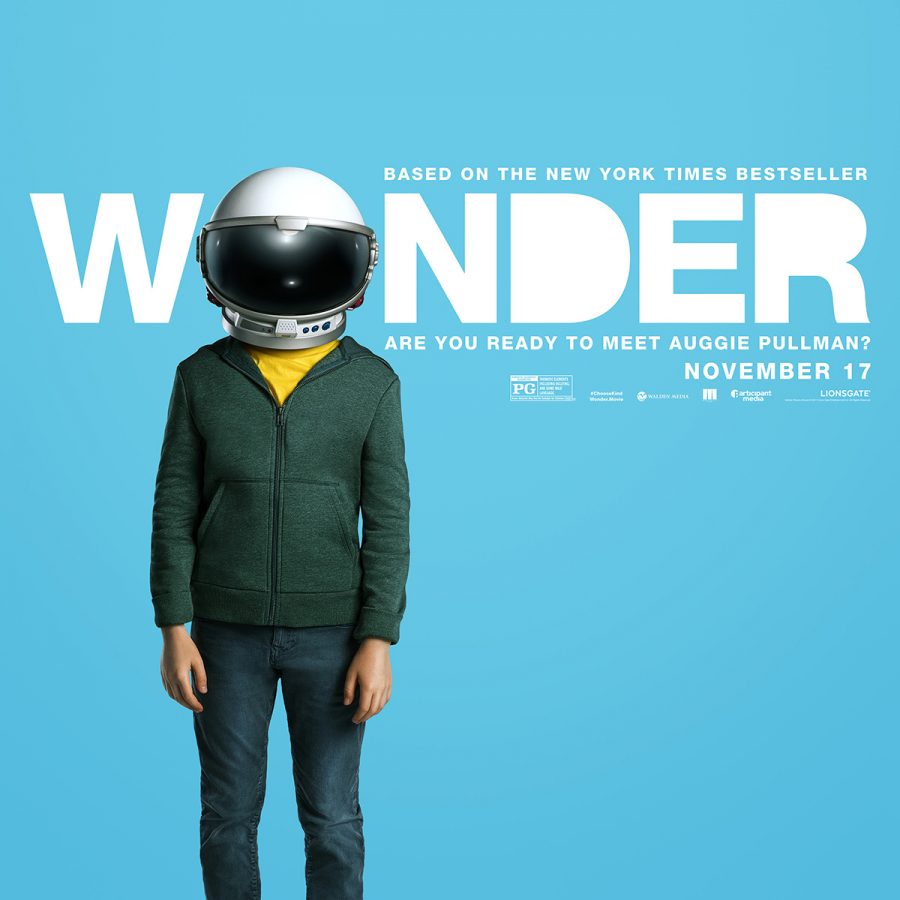Wonder: Tales of Despair, Love and Everything in Between
Wonder
January 30, 2018
On February 12, 2012, R. J. Palacio published Wonder, a beautiful novel about August “Auggie” Pullman, a child with a facial deformity. The novel tells the story of the Pullman family, who all experience great life changes as August enters a mainstream school, facing heart-wrenching obstacles and hilarious events along the way. Wonder is a tale widely regarded as the perfect depiction of each of the diverse characters it features, and its spot on the New York Times Bestsellers List furthers this opinion.
Recently, Wonder has found itself added to the long list of book-to-movie adaptations, a film by the same name released on November 17, 2017. The movie has been met with only praise from critics and viewers alike, Common Sense Media claiming, “Based on R. J. Palacio’s hugely popular, award-winning novel, this drama is earnest and sweet, with great messages about kindness, friendship, and acceptance for its tween target audience.”
Previous to the movie’s release, however, there was caution from readers who had fallen in love with the story from the novel, as many feared the film would disappoint in capturing the magic of Wonder. Nevertheless, the movie did not disappoint and, as both a reader and viewer, I would like to make the case that it exceeded even what the novel accomplished. While there are obvious benefits to a full novel, and rarely do film adaptations surpass the accomplishments of a book, the movie truly managed to have a perfect mix of humor, sadness, and love.
Despite the movie’s success both financially and in its quality, the book did have several memorable moments which let it shine. For example, the novel version of Wonder had much more space to build up the character of the main protagonist, August Pullman. The novel’s length allowed for Auggie to feel like a more well-rounded character with faults and beauties of his own. Also, the novel allowed for more in-depth interpretation of the events which occurred in the story. Within the movie, certain events left me confused, from sporadic crying to random fight scenes. Some of the occurrences within the movie version of Wonder even seemed out of place and were poorly explained. Meanwhile, the novel had a chance to analyze every event, which added more substance to the story and its characters.
It is, however, undeniable that the movie did an amazing job in its interpretation of the novel. The cast was phenomenal, with Jacob Tremblay leading the group of actors after his breakout role in the similarly beloved adaptation of the novel Room. Julia Roberts, Izabela Vidovic, and the numerous other child cast members delivered brutally honest and emotional performances as well, with Owen Wilson adding an element of undeniable humor to the movie. Consequently, the movie did a much better job of emphasizing the sad aspects of the life of a deformed child and the corrupt society which surrounds said child. Multiple times throughout the movie, I myself teared up and sniffles and cries alike filled the theater around me.
The movie adaptation also did a better job in representing the lives of characters who were not August. While Auggie was still the main character in the movie, the lives of his teenage sister and parents were also emphasized, certain storylines being spotlighted which I found myself missing while reading the novel. The movie managed to create characters which were well-rounded beyond just August. Finally, the film adaptation also succeeded in bringing an aspect of representation within the story, a movement which has been largely ignored in the past and has only become prominent within these last few years. The movie saw three black characters, at no expense of their personalities or storylines, while the novel barely described one character as tan. While leeway may be given to the book for its ultimate theme that it is not someone’s appearance that matters but their personality, it was supremely important that the movie featured several characters from minority groups, a step in the direction of positive representation.
Ultimately, while both the novel and movie versions of Wonder were heartfelt tales of overcoming struggles, each having their advantages and disadvantages, the movie version managed to capture the magic of the book and beyond, leaving its viewers with an unforgettable experience.


